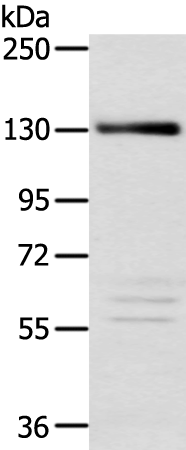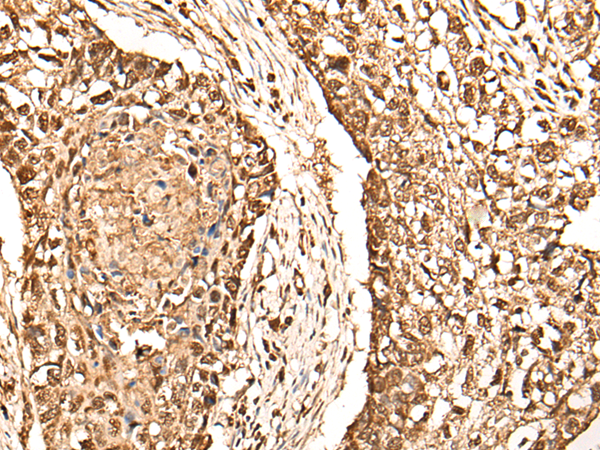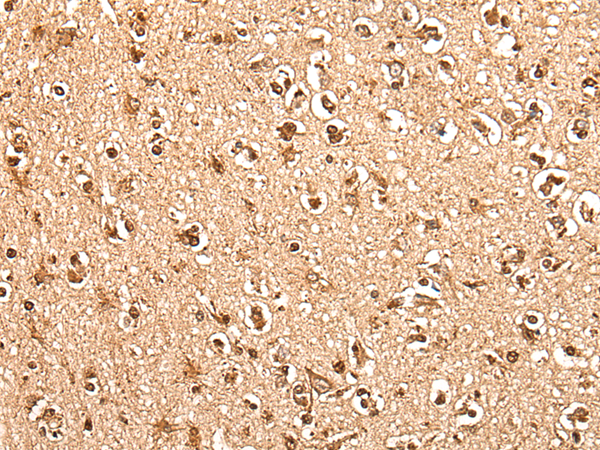


| WB | 咨询技术 | Human,Mouse,Rat |
| IF | 咨询技术 | Human,Mouse,Rat |
| IHC | 1/30-1/150 | Human,Mouse,Rat |
| ICC | 技术咨询 | Human,Mouse,Rat |
| FCM | 咨询技术 | Human,Mouse,Rat |
| Elisa | 1/5000-1/10000 | Human,Mouse,Rat |
| Aliases | Rb2; P130 |
| WB Predicted band size | 128 kDa |
| Host/Isotype | Rabbit IgG |
| Antibody Type | Primary antibody |
| Storage | Store at 4°C short term. Aliquot and store at -20°C long term. Avoid freeze/thaw cycles. |
| Species Reactivity | Human, Mouse, Rat |
| Immunogen | Synthetic peptide of human RBL2 |
| Formulation | Purified antibody in PBS with 0.05% sodium azide and 50% glycerol. |
+ +
以下是关于RBL2(p130)抗体的研究文献示例(注:内容为概括性示例,建议通过学术数据库核实具体文献):
---
1. **文献名称**:*RBL2/p130 Expression in Non-Small Cell Lung Cancer: Correlation with Clinical Outcome*
**作者**:Smith A, et al.
**摘要**:研究通过免疫组化使用RBL2抗体检测非小细胞肺癌组织中p130蛋白表达,发现低表达与患者生存率下降和肿瘤侵袭性增强相关,提示其作为预后标志物的潜力。
2. **文献名称**:*Interaction of RBL2 with E2F4 in Cell Cycle Arrest*
**作者**:Jones B, et al.
**摘要**:利用RBL2抗体进行免疫共沉淀和Western blot实验,证实RBL2与转录因子E2F4在G0期形成复合物,调控细胞周期退出,揭示了其在细胞静默中的分子机制。
3. **文献名称**:*Epigenetic Silencing of RBL2 in Breast Cancer via Promoter Methylation*
**作者**:Chen L, et al.
**摘要**:通过甲基化特异性PCR和RBL2抗体检测,发现乳腺癌中RBL2启动子高甲基化导致蛋白表达缺失,恢复其表达可抑制癌细胞增殖,提示表观遗传治疗的潜在靶点。
4. **文献名称**:*RBL2/p130 Modulates DNA Damage Response through BRCA1 Regulation*
**作者**:Wang Y, et al.
**摘要**:研究采用RBL2抗体进行染色质免疫沉淀(ChIP),阐明RBL2在DNA损伤后与BRCA1协同修复双链断裂的作用,缺失RBL2会导致基因组不稳定性增加。
---
建议通过 **PubMed** 或 **Web of Science** 搜索关键词“RBL2 antibody”、“p130 protein expression”等获取具体文献。
The RBL2 antibody is designed to target Retinoblastoma-like protein 2 (RBL2), also known as p130. a member of the retinoblastoma (Rb) tumor suppressor protein family that includes pRb (p105), p107. and p130. These proteins play critical roles in cell cycle regulation, primarily by inhibiting the G1-to-S phase transition through interactions with E2F transcription factors. RBL2/p130. encoded by the *RBL2* gene, shares structural homology with other Rb family members, particularly in the conserved "pocket domain" responsible for binding viral oncoproteins and cellular partners. Unlike pRb, which is predominantly expressed in differentiating cells, RBL2/p130 is highly expressed in quiescent or terminally differentiated cells, where it forms repressive complexes with E2F4 or E2F5 to silence cell cycle-promoting genes.
Antibodies against RBL2 are widely used in research to study its expression, localization, and functional interactions in cellular contexts such as proliferation, differentiation, and apoptosis. Dysregulation of RBL2/p130 has been linked to various cancers, where loss or mutation contributes to uncontrolled cell growth. Additionally, RBL2/p130 is involved in developmental processes and cellular senescence. Researchers employ RBL2 antibodies in techniques like Western blotting, immunohistochemistry, and co-immunoprecipitation to explore its role in tumor suppression, its phosphorylation-dependent inactivation during cell cycle progression, and its interplay with oncogenic viruses. These studies provide insights into cancer mechanisms and potential therapeutic targets.
×